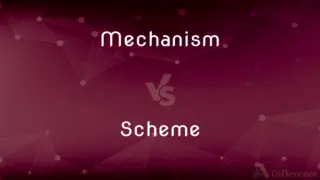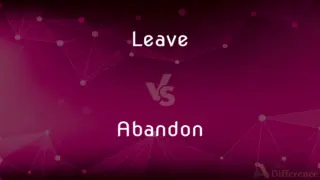Humankind vs. Mankind — What's the Difference?
By Urooj Arif & Maham Liaqat — Updated on March 9, 2024
Humankind emphasizes inclusivity and modern sensibilities, while mankind is traditional but less favored due to perceived gender bias.

Difference Between Humankind and Mankind
Table of Contents
ADVERTISEMENT
Key Differences
Humankind is a more inclusive term that reflects modern sensibilities and efforts to avoid gender-specific language, suggesting a collective that encompasses all humans without implying a particular gender. Whereas mankind, a traditional term, has been used historically to refer to humanity as a whole but is less favored in contemporary contexts due to its perceived male-centric language, which some argue could exclude or devalue the contribution of women.
The evolution of language has seen a shift towards terms like humankind to promote equality and neutrality, reflecting societal changes and a move away from gendered language. On the other hand, mankind, despite its longstanding use in literature and historical texts, faces scrutiny and decreasing popularity as awareness of inclusive language grows.
Usage in different contexts can also highlight the nuances between the two; for example, scientific and academic communities increasingly prefer humankind to ensure clarity and inclusivity. In contrast, mankind might still be found in historical, religious, or philosophical discussions, maintaining its traditional resonance.
The choice between humankind and mankind can also signal the speaker or writer's values, with humankind often chosen by those wishing to emphasize inclusivity and gender neutrality. Meanwhile, those using mankind might either be referencing traditional texts or concepts or simply using it out of habit without intending to exclude.
While both terms ultimately denote the same concept—the human species—their connotations and implications in use can vary significantly, making the choice between them a reflection of contemporary linguistic preferences and social values.
ADVERTISEMENT
Comparison Chart
Inclusivity
Gender-neutral and inclusive
Perceived as less inclusive
Language evolution
Reflects modern sensibilities
Traditional, historical usage
Preferred contexts
Scientific, academic
Historical, religious
Values
Equality, neutrality
Tradition, habit
Implication
Emphasizes collective humanity
May imply male-centric view
Compare with Definitions
Humankind
Gender-neutral language.
The achievements of humankind include advancements in technology.
Mankind
Traditional term for humanity.
Mankind has long pondered the mysteries of the universe.
Humankind
Reflects modern sensibilities.
The progress of humankind depends on cooperation.
Mankind
Used in historical texts.
The history of mankind is filled with both conflict and cooperation.
Humankind
Inclusive term for humanity.
Humankind has always sought to explore the unknown.
Mankind
May imply male-centric language.
Mankind's earliest inventions revolutionized life.
Humankind
Emphasizes collective humanity.
Climate change is a challenge for all of humankind.
Mankind
Found in religious contexts.
In many religious texts, mankind is tasked with stewardship of the earth.
Humankind
Used in scientific contexts.
The study of humankind reveals diverse cultures and histories.
Mankind
Signals traditional values.
The wisdom of mankind has been passed down through generations.
Humankind
The human race
"humankind's God-given creativity" (New York Times).
Mankind
The human race; humankind. See Usage Note at man.
Humankind
The human race; mankind, humanity; Homo sapiens.
Mankind
Men as opposed to women.
Humankind
Mankind.
Mankind
The human race in its entirety.
Humankind
All of the inhabitants of the earth;
All the world loves a lover
She always used `humankind' because `mankind' seemed to slight the women
Mankind
Men collectively, as opposed to all women.
Mankind
(obsolete) Human feelings; humanity.
Mankind
The human race; man, taken collectively.
The proper study of mankind is man.
Mankind
Men, as distinguished from women; the male portion of human race.
Mankind
Human feelings; humanity.
Mankind
Manlike; not womanly; masculine; bold; cruel.
Are women grown so mankind? Must they be wooing?
Be not too mankind against your wife.
Mankind
All of the inhabitants of the earth;
All the world loves a lover
She always used `humankind' because `mankind' seemed to slight the women
Common Curiosities
Is humankind a modern invention?
The term reflects modern linguistic preferences, but the concept of humanity is ancient.
Why is mankind considered less inclusive?
It's seen as implying a male-centric view of humanity, which some find exclusive.
Is the use of mankind offensive?
It can be to those who advocate for gender-neutral language.
Can I use mankind in academic writing?
While acceptable, humankind is often preferred for its inclusivity.
Does humankind include all genders?
Yes, it's intended to be fully inclusive of all human beings.
Is humankind more politically correct?
It's considered more inclusive and sensitive to modern linguistic preferences.
Does literature still use mankind?
Yes, especially in historical or classical texts.
Is mankind still used in religious contexts?
Yes, particularly in traditional or historical religious texts.
Was mankind always about men?
Historically, it referred to all humans, but its perceived male bias is contested today.
Are there alternatives to both terms?
"Humanity" is another inclusive alternative.
Why is inclusivity in language important?
It reflects and promotes equality and respect among all people.
Can I use both terms interchangeably?
While they mean the same, their connotations differ, so context and audience matter.
Will mankind become obsolete?
Its usage may decline, but it's unlikely to become entirely obsolete due to historical and literary significance.
Does changing from mankind to humankind impact meaning?
The essential meaning remains, but the inclusivity and modern sensibility are enhanced.
How do scientists refer to the human species?
They often use "humankind" or "Homo sapiens" for precision and inclusivity.
Share Your Discovery

Previous Comparison
Mechanism vs. Scheme
Next Comparison
Leave vs. AbandonAuthor Spotlight
Written by
Urooj ArifUrooj is a skilled content writer at Ask Difference, known for her exceptional ability to simplify complex topics into engaging and informative content. With a passion for research and a flair for clear, concise writing, she consistently delivers articles that resonate with our diverse audience.
Co-written by
Maham Liaqat











































